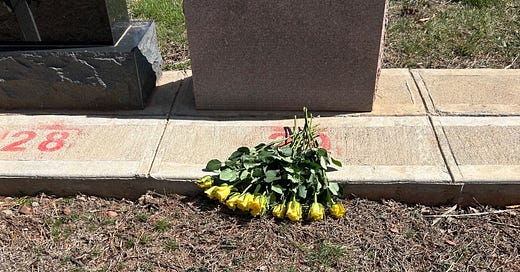They tell you it's sacred to be there at the end. Grief books, hospice workers, and well-meaning friends who share their stories of holding hands as someone slipped away peacefully. There's supposed to be something holy about witnessing a final breath that transforms the terror of death into acceptance, even beauty.
I wouldn't know.
Despite losses that have reshaped the very essence of my being, I have never been present for the death of someone I love. Not once. And in the raw mathematics of my grief, this absence has carved out its own particular ache.
Mom died in the middle of the night—a catastrophic collision of stroke and heart attack that took her decisively, without warning or witnesses. Two years of watching her partner of 65 years decline had worn her heart thin, and when it finally gave way, it did so completely. Dad followed seven weeks later, his congestive heart failure claiming him after six months of hospice care, but not when any of us were there.
Then came Annemarie's devastating diagnosis: glioblastoma multiforme. Those clinical words that sound almost musical until you understand they're a death sentence. She suffered in every dimension a person can suffer—spiritually, physically, emotionally. The disease stripped away everything that made her herself, piece by piece, until even her suffering became unrecognizable. When the end came, I wasn't there for that either.
Two weeks after my sister died, my dear mother-in-law suffered a fatal heart attack at a funeral. The cruel irony wasn't lost on any of us—death claiming another life in the very space where we gather to honor the dead.
Four profound losses. Four sacred moments I missed entirely.
My grief has been raw and jagged, complicated in ways I'm still trying to understand. The most surprising complication has been this: the depth of sadness I carry for not being present at any of these deaths. It feels like I wasn’t allowed in somehow, like I missed the most important appointment of our relationship.
I've read about the comfort that can come from bearing witness to death. How holding space for someone's final moments can transform our understanding of both death and life. How it can provide a sense of completion, of having accompanied a loved one all the way to the threshold they must cross alone. There's supposed to be something healing in seeing that death, when it comes naturally, can be peaceful—a gentle exhale rather than a violent rupture.
But what about those of us who never receive that gift? What about the families scattered by distance or circumstance, the sudden deaths that offer no opportunity for bedside vigils, the long illnesses that end when we've stepped away for just a moment?
In the isolation of my particular grief, I've wondered if I'm somehow deficient in my mourning—if the absence of those final moments has left me with an incomplete grief, a love story without its proper ending. The rational part of me knows this isn't true, that love doesn't require witness to death to be complete. But grief isn't rational, and it certainly isn't fair in how it distributes its burdens.
I am learning that there are different kinds of sacred moments in death and dying. While I wasn't present for any final breaths, I was present for countless other moments that were equally holy: the afternoon Mom and I spent putting a puzzle together, me making her laugh until her shoulders shook and she called me terrible, neither one of us knowing it would be our last hangout. The morning Dad told me I was “good enough,” his pithy Scandinavian way of saying that he was proud of the person I'd become. The way Annemarie’s face lit up when I showed up with VooDoo Donuts. The countless small acts of love my mother-in-law performed welcoming me into her family.
I’ve come to learn that the sacred isn't confined to deathbeds. It’s scattered in the ordinary moments when we choose to really see each other, to be fully present with the people we love while they're still here to be seen. I think bearing witness to a life is just as important as bearing witness to a death.
It cuts deep when I read about peaceful deaths, hands held, final words exchanged and I probably always will. I'm still learning to let go of what I missed, finding solace in what I was given: years of love, moments of connection, the privilege of being someone's daughter, sister, daughter-in-law.
Sure, we all die alone, whether or not someone is holding our hand. But we don't have to live alone, and we don't have to grieve alone. The love we shared doesn't require a witness to validate it. It simply requires us to carry it forward, to let it change us, to honor it by continuing to love others while we still can.
That, too, is sacred.





